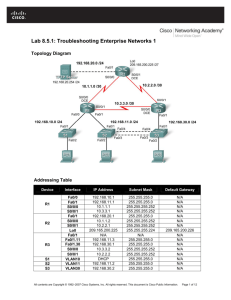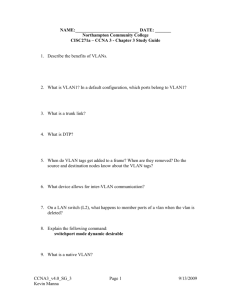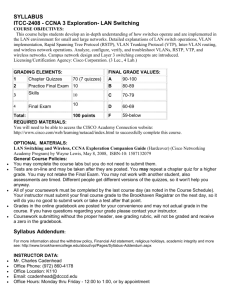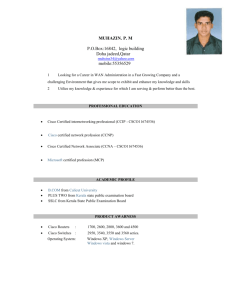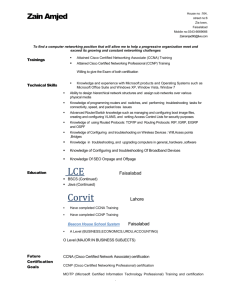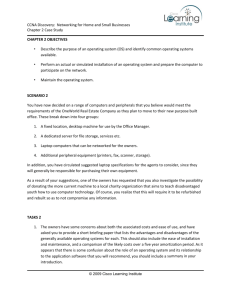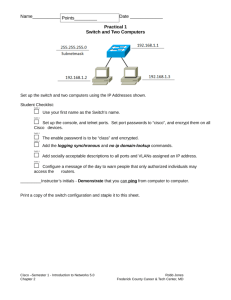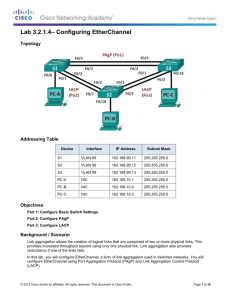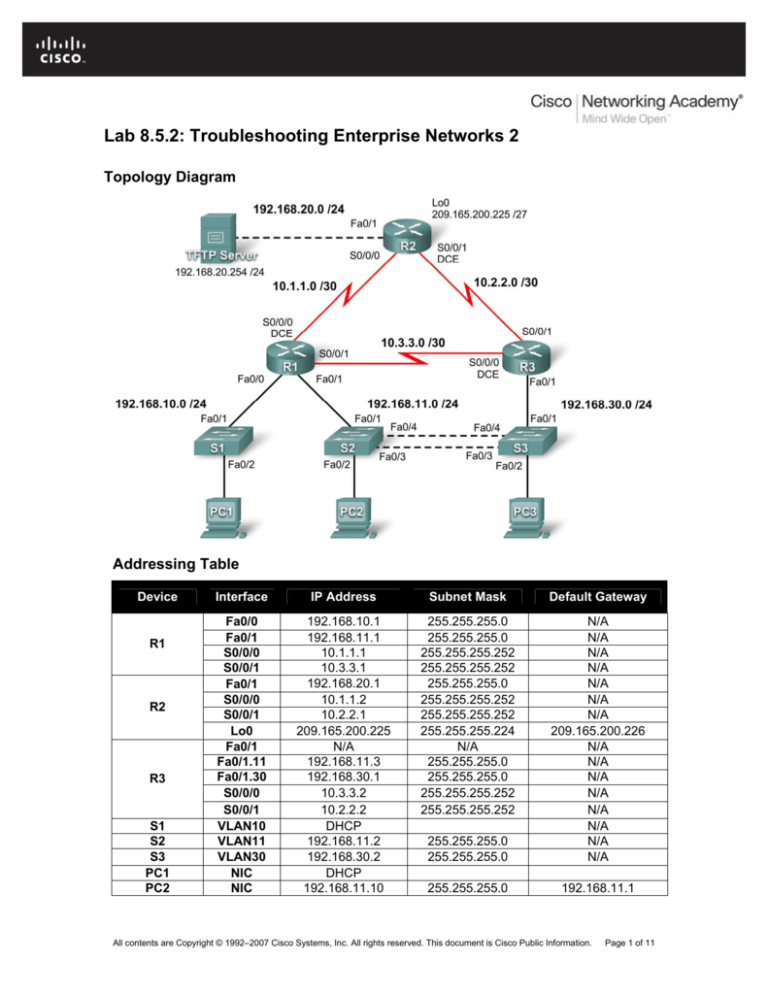
Lab 8.5.2: Troubleshooting Enterprise Networks 2
Topology Diagram
Addressing Table
Device
R1
R2
R3
S1
S2
S3
PC1
PC2
Interface
IP Address
Subnet Mask
Default Gateway
Fa0/0
Fa0/1
S0/0/0
S0/0/1
Fa0/1
S0/0/0
S0/0/1
Lo0
Fa0/1
Fa0/1.11
Fa0/1.30
S0/0/0
S0/0/1
VLAN10
VLAN11
VLAN30
NIC
NIC
192.168.10.1
192.168.11.1
10.1.1.1
10.3.3.1
192.168.20.1
10.1.1.2
10.2.2.1
209.165.200.225
N/A
192.168.11.3
192.168.30.1
10.3.3.2
10.2.2.2
DHCP
192.168.11.2
192.168.30.2
DHCP
192.168.11.10
255.255.255.0
255.255.255.0
255.255.255.252
255.255.255.252
255.255.255.0
255.255.255.252
255.255.255.252
255.255.255.224
N/A
255.255.255.0
255.255.255.0
255.255.255.252
255.255.255.252
255.255.255.0
255.255.255.0
N/A
N/A
N/A
N/A
N/A
N/A
N/A
209.165.200.226
N/A
N/A
N/A
N/A
N/A
N/A
N/A
N/A
255.255.255.0
192.168.11.1
All contents are Copyright © 1992–2007 Cisco Systems, Inc. All rights reserved. This document is Cisco Public Information.
Page 1 of 11
CCNA Exploration
Accessing the WAN: Network Troubleshooting
PC3
TFTP Server
NIC
NIC
192.168.30.10
192.168.20.254
Lab 8.5.2: Troubleshooting Enterprise Networks 2
255.255.255.0
255.255.255.0
192.168.30.1
192.168.20.1
Learning Objectives
Upon completion of this lab, you will be able to:
•
Cable a network according to the topology diagram
•
Erase the startup configuration and reload a router to the default state
•
Load the routers and switches with supplied scripts
•
Find and correct all network errors
•
Document the corrected network
Scenario
For this lab, do not use login or password protection on any console lines to prevent accidental
lockout. Use ciscoccna for all passwords in this lab.
Note: Because this lab is cumulative, you will be using all the knowledge and troubleshooting
techniques that you have acquired from the previous material to successfully complete this lab.
Requirements
•
S2 is the spanning-tree root for VLAN 11, and S3 is the spanning-tree root for VLAN 30.
•
S3 is a VTP server with S2 as a client.
•
The serial link between R1 and R2 is Frame Relay.
•
The serial link between R2 and R3 uses HDLC encapsulation.
•
The serial link between R1 and R3 is authenticated using CHAP.
•
R2 must have secure login procedures because it is the Internet edge router.
•
All vty lines, except those belonging to R2, allow connections only from the subnets
shown in the topology diagram, excluding the public address.
•
Source IP address spoofing should be prevented on all links that do not connect to other
routers.
•
Routing protocols must be used securely. EIGRP is used in this scenario.
•
R3 must not be able to telnet to R2 through the directly connected serial link.
•
R3 has access to both VLAN 11 and 30 via its Fast Ethernet port 0/1.
•
The TFTP server should not get any traffic that has a source address outside the subnet.
All devices have access to the TFTP server.
•
All devices on the 192.168.10.0 subnet must be able to get their IP addresses from
DHCP on R1. This includes S1.
•
All addresses shown in diagram must be reachable from every device.
Task 1: Load Routers with the Supplied Scripts
!-----------------------------------------!
R1
!-----------------------------------------no service password-encryption
!
hostname R1
!
All contents are Copyright © 1992–2007 Cisco Systems, Inc. All rights reserved. This document is Cisco Public Information.
Page 2 of 11
CCNA Exploration
Accessing the WAN: Network Troubleshooting
Lab 8.5.2: Troubleshooting Enterprise Networks 2
boot-start-marker
boot-end-marker
!
security passwords min-length 6
enable secret ciscoccna
!
ip cef
!
ip dhcp pool Access1
network 192.168.10.0 255.255.255.0
default-router 192.168.10.1
!
no ip domain lookup
frame-relay switching
!
username R2 password ciscoccna
username ccna password ciscoccna
!
interface FastEthernet0/0
ip address 192.168.10.1 255.255.255.0
ip access-group Anti-spoofing out
duplex auto
speed auto
no shutdown
!
interface FastEthernet0/1
ip address 192.168.11.1 255.255.255.0
duplex auto
speed auto
no shutdown
!
interface Serial0/0/0
ip address 10.1.1.1 255.255.255.252
encapsulation frame-relay
no keepalive
clockrate 128000
frame-relay map ip 10.1.1.1 201
frame-relay map ip 10.1.1.2 201 broadcast
no frame-relay inverse-arp
frame-relay intf-type dce
no shutdown
!
interface Serial0/0/1
ip address 10.3.3.1 255.255.255.0
encapsulation ppp
ppp authentication chap
no shutdown
!
!
router eigrp 10
passive-interface default
no passive-interface FastEthernet0/0
no passive-interface FastEthernet0/1
no passive-interface Serial0/0/0
no passive-interface Serial0/0/1
network 10.1.1.0 0.0.0.255
All contents are Copyright © 1992–2007 Cisco Systems, Inc. All rights reserved. This document is Cisco Public Information.
Page 3 of 11
CCNA Exploration
Accessing the WAN: Network Troubleshooting
Lab 8.5.2: Troubleshooting Enterprise Networks 2
network 10.2.2.0 0.0.0.255
network 192.168.10.0 0.0.0.255
network 192.168.11.0 0.0.0.255
no auto-summary
!
ip route 0.0.0.0 0.0.0.0 10.1.1.2
!
ip http server
!
ip access-list standard Anti-spoofing
permit 192.168.10.0 0.0.0.255
deny
any
ip access-list standard VTY
permit 10.0.0.0 0.255.255.255
permit 192.168.10.0 0.0.0.255
permit 192.168.11.0 0.0.0.255
permit 192.168.20.0 0.0.0.255
permit 192.168.30.0 0.0.0.255
!
line con 0
exec-timeout 5 0
logging synchronous
line aux 0
line vty 0 4
access-class VTY in
login local
!
end
!-----------------------------------------!
R2
!-----------------------------------------no service password-encryption
!
hostname R2
!
security passwords min-length 6
enable secret ciscoccna
!
aaa new-model
!
aaa authentication login local_auth local
aaa session-id common
!
ip cef
!
no ip domain lookup
!
username ccna password 0 ciscoccna
!
interface Loopback0
ip address 209.165.200.225 255.255.255.224
ip access-group private in
!
interface FastEthernet0/1
ip address 192.168.20.1 255.255.255.0
ip access-group TFTP out
All contents are Copyright © 1992–2007 Cisco Systems, Inc. All rights reserved. This document is Cisco Public Information.
Page 4 of 11
CCNA Exploration
Accessing the WAN: Network Troubleshooting
Lab 8.5.2: Troubleshooting Enterprise Networks 2
ip access-group Anti-spoofing in
ip nat outside
no shutdown
!
!
interface Serial0/0/0
ip address 10.1.1.2 255.255.255.252
ip nat inside
encapsulation frame-relay
no keepalive
frame-relay map ip 10.1.1.1 201 broadcast
frame-relay map ip 10.1.1.2 201
no frame-relay inverse-arp
no shutdown
!
interface Serial0/0/1
ip address 10.2.2.1 255.255.255.252
ip nat inside
clockrate 128000
no shutdown
!
!
router eigrp 100
passive-interface default
no passive-interface FastEthernet0/1
no passive-interface Serial0/0/0
no passive-interface Serial0/0/1
no passive interface lo0
network 10.1.1.0 0.0.0.3
network 10.2.2.0 0.0.0.3
network 192.168.20.0 0.0.0.255
network 209.165.200.0 0.0.0.7
no auto-summary
!
ip route 0.0.0.0 0.0.0.0 209.165.200.226
!
no ip http server
ip nat inside source list NAT interface FastEthernet0/0 overload
!
ip access-list standard Anti-spoofing
permit 192.168.20.0 0.0.0.255
deny
any
ip access-list standard NAT
permit 10.0.0.0 0.255.255.255
permit 192.168.0.0 0.0.255.255
ip access-list standard private
deny
127.0.0.1
deny
10.0.0.0 0.255.255.255
deny
172.16.0.0 0.15.255.255
deny
192.168.0.0 0.0.255.255
permit any
!
ip access-list extended R3-telnet
deny
tcp host 10.2.2.2 host 10.2.2.1 eq telnet
deny
tcp host 10.3.3.2 host 10.2.2.1 eq telnet
deny
tcp host 192.168.11.3 host 10.2.2.1 eq telnet
All contents are Copyright © 1992–2007 Cisco Systems, Inc. All rights reserved. This document is Cisco Public Information.
Page 5 of 11
CCNA Exploration
Accessing the WAN: Network Troubleshooting
deny
Lab 8.5.2: Troubleshooting Enterprise Networks 2
tcp host 192.168.30.1 host 10.2.2.1 eq telnet
!
ip access-list standard TFTP
permit 192.168.20.0 0.0.0.255
!
control-plane
!
line con 0
exec-timeout 5 0
logging synchronous
line aux 0
exec-timeout 15 0
logging synchronous
login authentication local_auth
transport output telnet
line vty 0 4
exec-timeout 15 0
logging synchronous
login authentication local_auth
transport input telnet
!
end
!-----------------------------------------!
R3
!-----------------------------------------no service password-encryption
!
hostname R3
!
security passwords min-length 6
!
no aaa new-model
!
ip cef
!
no ip domain lookup
!
username R1 password ciscoccna
username ccna password ciscoccna
!
interface FastEthernet0/1
no shutdown
!
interface FastEthernet0/1.11
encapsulation dot1Q 11
ip address 192.168.11.3 255.255.255.0
no snmp trap link-status
!
interface FastEthernet0/1.30
encapsulation dot1Q 30
ip address 192.168.30.1 255.255.255.0
ip access-group Anti-Spoofin in
no shutdown
!
!
All contents are Copyright © 1992–2007 Cisco Systems, Inc. All rights reserved. This document is Cisco Public Information.
Page 6 of 11
CCNA Exploration
Accessing the WAN: Network Troubleshooting
Lab 8.5.2: Troubleshooting Enterprise Networks 2
interface Serial0/0/0
ip address 10.3.3.2 255.255.255.252
encapsulation ppp
ppp authentication pap
!
interface Serial0/0/1
ip address 10.2.2.2 255.255.255.252
no shutdown
!
router eigrp 10
network 10.3.3.0 0.0.0.3
network 10.2.2.0 0.0.0.3
network 192.168.11.0 0.0.0.255
network 192.168.30.0 0.0.0.255
no auto-summary
!
ip classless
!
ip http server
!
ip access-list standard Anti-spoofing
permit 192.168.30.0 0.0.0.255
deny
any
ip access-list standard VTY
permit 10.0.0.0 0.255.255.255
permit 192.168.10.0 0.0.0.255
permit 192.168.11.0 0.0.0.255
permit 192.168.20.0 0.0.0.255
permit 192.168.30.0 0.0.0.255
!
!
line con 0
exec-timeout 5 0
logging synchronous
line aux 0
exec-timeout 15 0
logging synchronous
line vty 0 4
access-class VTY out
exec-timeout 15 0
logging synchronous
login local
!
end
!----------------------------------------!
S1
!----------------------------------------no service password-encryption
!
hostname S1
!
security passwords min-length 6
enable secret ciscoccna
!
no aaa new-model
vtp domain CCNA_Troubleshooting
All contents are Copyright © 1992–2007 Cisco Systems, Inc. All rights reserved. This document is Cisco Public Information.
Page 7 of 11
CCNA Exploration
Accessing the WAN: Network Troubleshooting
Lab 8.5.2: Troubleshooting Enterprise Networks 2
vtp mode transparent
vtp password ciscoccna
ip subnet-zero
!
no ip domain-lookup
!
no file verify auto
spanning-tree mode pvst
spanning-tree extend system-id
!
vlan internal allocation policy ascending
!
vlan 10
!
interface FastEthernet0/1
switchport access vlan 10
switchport mode access
!
interface FastEthernet0/2
switchport access vlan 10
switchport mode access
!
interface range FastEthernet0/3-24
!
interface GigabitEthernet0/1
shutdown
!
interface GigabitEthernet0/2
shutdown
!
interface Vlan1
no ip address
no ip route-cache
!
interface Vlan10
ip address dhcp
no ip route-cache
!
ip default-gateway 192.168.10.1
ip http server
!
line con 0
exec-timeout 5 0
logging synchronous
line vty 0 4
password ciscoccna
login
line vty 5 15
no login
!
end
!----------------------------------------!
S2
!----------------------------------------no service pad
service timestamps debug uptime
All contents are Copyright © 1992–2007 Cisco Systems, Inc. All rights reserved. This document is Cisco Public Information.
Page 8 of 11
CCNA Exploration
Accessing the WAN: Network Troubleshooting
Lab 8.5.2: Troubleshooting Enterprise Networks 2
service timestamps log uptime
no service password-encryption
!
hostname S2
!
security passwords min-length 6
enable secret ciscoccna
!
no aaa new-model
vtp domain CCNA_Troubleshooting
vtp mode Client
vtp password ciscoccna
ip subnet-zero
!
no ip domain-lookup
!
no file verify auto
!
spanning-tree mode mst
spanning-tree extend system-id
spanning-tree vlan 30 priority 4096
!
vlan internal allocation policy ascending
!
interface FastEthernet0/1
switchport access vlan 11
switchport mode access
!
interface FastEthernet0/2
switchport access vlan 11
switchport mode access
!
interface FastEthernet0/3
switchport trunk allowed vlan 11,30
switchport mode trunk
!
interface FastEthernet0/4
switchport trunk allowed vlan 11,30
switchport mode trunk
!
interface range FastEthernet0/5-24
shutdown
!
interface GigabitEthernet0/1
shutdown
!
interface GigabitEthernet0/2
shutdown
!
interface Vlan1
no ip address
no ip route-cache
!
interface Vlan11
ip address 192.168.11.2 255.255.255.0
no ip route-cache
All contents are Copyright © 1992–2007 Cisco Systems, Inc. All rights reserved. This document is Cisco Public Information.
Page 9 of 11
CCNA Exploration
Accessing the WAN: Network Troubleshooting
Lab 8.5.2: Troubleshooting Enterprise Networks 2
!
ip http server
!
control-plane
!
line con 0
exec-timeout 5 0
logging synchronous
line vty 0 4
password ciscoccna
login
line vty 5 15
no login
!
end
!----------------------------------------!
S3
!----------------------------------------no service password-encryption
!
hostname S3
!
security passwords min-length 6
enable secret ciscoccna
!
no aaa new-model
vtp domain CCNA_Troubleshooting
vtp mode Server
vtp password ciscoccna
ip subnet-zero
!
no ip domain-lookup
!
no file verify auto
!
spanning-tree mode rapid-pvst
spanning-tree extend system-id
spanning-tree vlan 11 priority 4096
vlan internal allocation policy ascending
!
Vlan 11,30
!
interface FastEthernet0/1
switchport trunk allowed vlan 11,30
switchport mode trunk
!
interface FastEthernet0/2
switchport access vlan 30
switchport mode access
!
interface FastEthernet0/3
switchport trunk allowed vlan 11,30
switchport mode trunk
!
interface FastEthernet0/4
All contents are Copyright © 1992–2007 Cisco Systems, Inc. All rights reserved. This document is Cisco Public Information. Page 10 of 11
CCNA Exploration
Accessing the WAN: Network Troubleshooting
Lab 8.5.2: Troubleshooting Enterprise Networks 2
switchport trunk allowed vlan 11,30
switchport mode trunk
!
interface range FastEthernet0/5-24
shutdown
!
interface GigabitEthernet0/1
shutdown
!
interface GigabitEthernet0/2
shutdown
!
interface Vlan1
no ip address
no ip route-cache
!
interface Vlan30
ip address 192.168.30.2 255.255.255.0
no ip route-cache
!
ip default-gateway 192.168.30.1
ip http server
!
line con 0
exec-timeout 5 0
logging synchronous
line vty 0 4
password ciscoccna
login
line vty 5 15
no login
!
end
Task 2: Find and Correct All Network Errors
Task 3: Verify that Requirements Are Fully Met
Task 4: Document the Corrected Network
Task 5: Clean Up
Erase the configurations and reload the routers. Disconnect and store the cabling. For PC hosts
that are normally connected to other networks (such as the school LAN or to the Internet),
reconnect the appropriate cabling and restore the TCP/IP settings.
All contents are Copyright © 1992–2007 Cisco Systems, Inc. All rights reserved. This document is Cisco Public Information. Page 11 of 11

